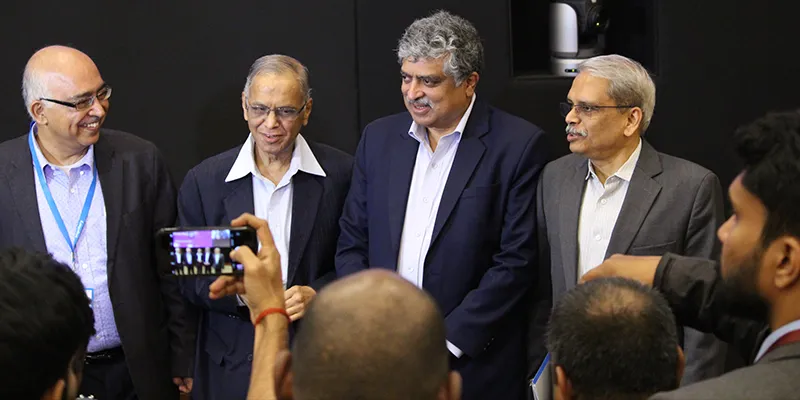The year that was at Infosys: Tussle took spotlight as Founder took on CEO
The resignation of CEO Vishal Sikka after he completed three years at Infosys was the culmination of a relentless wrangle between the Board and founder-shareholders, including Narayana Murthy, over issues of governance.
Takeaways for an aspiring CEO from this saga if running a legacy company?
- The company must embrace your disruptive nature and fly with it or do not sign up to run it.
- Do ensure Corporate Governance is your company's foundation.
- Take bold decisions but do not undermine the legacy built for shareholders.
- Judge your equations with founders wisely.
- If you want to shake up things shore up Board resources and not change the company overnight.
The year 2017 was a landmark one as far as business was concerned in India – the rollout of GST changed things, the e-commerce market saw higher investments, and AI and cryptocurrency captured the people’s imagination.
But in the middle of the year, there was just one thing that grabbed the spotlight – the tussle between Infosys Founder Narayana Murthy and CEO Vishal Sikka, which ultimately led to Sikka resigning soon after he completed three years at the IT giant.
The incident somewhat tarnished the image of the technology services and consulting major. But what was the reason for the split between the veteran and the reformist? Not the age-old young versus the old; it was blamed on conflicting behavioural styles.
The two were reported to be at loggerheads over acquisitions of a couple of companies, Panaya and Skava, and the high severance package paid to former CFO Rajeev Bansal.

But both had their backers.
Sandeep Johri, CEO of Tricentis, a mid-sized IT Services company and close friend of Sikka, says: “It was not the way Vishal should have been treated. It was very unfortunate because he was setting the future in context for Infosys by preparing for AI and Machine Learning.”
In Murthy's defence, there were more than 70 former “Infosysians”, in leadership positions, who signed a petition against the Board of Infosys for insulting Murthy over the exit of Sikka.
The inside story
No one really knows the inside story other than the fact that Murthy blamed the company for the failure of corporate governance and handling of issues. In fact, even an internal investigation did not yield any results. But, Murthy was right to ask questions because he felt one man was becoming too powerful in Infosys. That’s why Vishal Sikka is said to have put in papers and blamed “malicious” personal attacks by the founders.
When Infosys picked Sikka, he must have known what he was getting into. It was a mixed bag of emotions and pride as Infosys was a real Indian success story.
It all began on October 8, 2014, when Narayana Murthy addressed Infosys employees in the presence of Vishal and other founders, and stated that he hoped the company would be run with the same values as those of the founders.
The six founders of Infosys, which included Narayan Murthy, Kris Gopalakrishnan, Nandan Nilekani, SD Shibulal, NS Raghavan, and K Dinesh, stepped down that day and Sikka took over the running of the company amid high expectations.
Out of sync
In a highly emotional speech to Infosys employees, in one of the organisation’s grand halls, Narayana Murthy quoted one of the founding fathers of the Constitution of the US and spoke about the merits of democracy and civility.
In his speech, Murthy hinted that Sikka should be a flag bearer of compassionate capitalism, where employee productivity came first.
However, the narratives of the Chairman Emeritus and the new CEO were not in sync as the world of technology and IT services had changed.
Sikka endeavoured to change Infosys’ focus from a service-based company to a product and platforms company. Only five to seven percent of revenues came from platforms, and Sikka wanted to change this.
Over a three-year run, Sikka set the company towards a process of design thinking and reiterated that software was going to be more powerful than services. The company re-trained more than 1,80,000 employees in future-ready technologies like Machine Learning and Artificial Learning.
Backing entrepreneurs
During Sikka’s tenure, Infosys saw revenue grow at an 11.1 percent CAGR. He also set into motion an entrepreneurial mindset in the company, which currently has 9,500 “entrepreneurial” projects in the works.
“These are future entrepreneurs working on projects, and we have introduced a culture of innovation in the organisation,” Sikka had explained.
When things came to a boil
Issues between the two were simmering since December 2016 when Narayana Murthy asked the Board to improve its governance and expressed his unhappiness over the way it was being run. Questions were being asked over the acquisition of Panaya and Skava, and about the golden handshake given to ex-CFO Rajiv Bansal. Questions were also being raised over the senior management’s “high salaries”.
The board came out vocally against the allegations made by the Chairman Emeritus. They termed his letter to the board as “containing factual inaccuracies” and his actions and demands as “damaging to the company”.
Narayana Murthy, however, continued to attack the company, which finally led to Vishal’s resignation. A similar tussle occurred late last year between Rata Tata and Cyrus Mistry, where Mistry was ousted as Chairman of the Tata Group over similar allegations of unconventional management styles.
Globally these issues are common. The art of boardroom tussles is flourishing, and Infosys and Tata are not the only ones.
In the future
Now that Nandan Nilekani, another Co-founder, is captain of the ship again, he has found Salil Parekh to take over the reins of CEO from January 2018.
Parekh has to make investors believe that Infosys can work without the founders butting in.
In the coming year, Infosys must focus on getting its business back on track away from the negativity of 2017.







